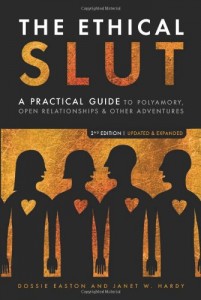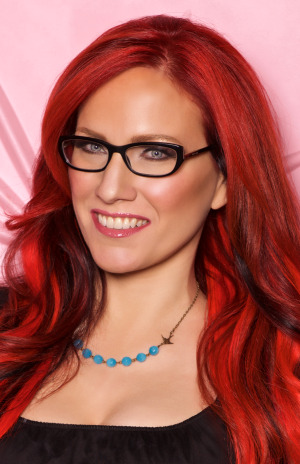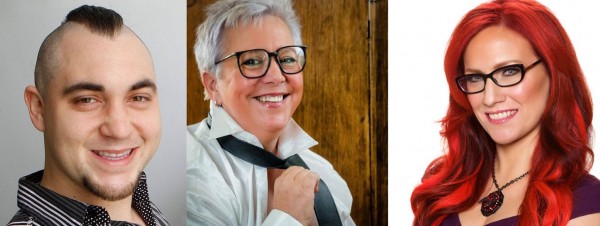This Saturday, poly educator Wry Mantione returns to Stockroom Hall with another one of his very popular Polytalk events, this time featuring two women who can only be described as rockstars of the non-monagamous community. Janet Hardy co-authored The Ethical Slut with Dossie Easton, which remains one of the must-reads for people considering consensual non-monogamy. Originally published in 1998, with a second edition released in 2009, for years it was the only widely-available book on building a polyamorous relationship. Since then, Hardy has written more books on a variety of topics, including her recent memoir, Girlfag.
Kate Loree is a licensed marriage and family therapist who’s become one of the few relationship professionals to speak publicly and frankly about alternative lifestyles. She has become a highly respected name among kinky and non-monagamous people in a field that often either pathologizes or ignores alternative sexualities. Wry spoke to us about these two women’s work, the upcoming event, and his own experiences living non-monogamously.
What’s the format of the event going to be like?
Typically I give an opening speech of about five minutes, just to get everyone in the spirit, and then I immediately start opening things up to questions from the floor. It’s an audience-driven event; a lot of the audience will have come to one of these before and there will be a lot of newbies as well, and people always have questions. So many of these events are just a lecture, and we try to avoid that, because then you wind up repeating yourself in a 101 format. Everything becomes a 101 class.
In the audience, there’ll be people who have been living this lifestyle for 20 years and some that are just curious about it and never done anything, so they’re there to learn.
Are you going to be focusing on anything in particular, or just letting things go as they will?

The Ethical Slut, Second Edition
Mostly let them go as they will. I’ll moderate as we go along and if we get stuck on anything, we’ll change topics, but we’ll also be focused on the various topics that Janet has written about. She’s written about eleven books, so there’s a lot to cover there, including her newest memoir called Girlfag. The title is quite divisive and revolutionary in itself, just to claim such an identity. She’s also heavily involved in the kink world, so it’ll be kind of like bouncing back and forth between the therapist’s perspective from Kate Loree versus the author’s perspective. I try to avoid too much of a plan.
Could you describe the work of both of these women and what you think that they’re bringing to this panel?
Kate Loree is becoming known as the therapist to the alt sexuality community of Los Angeles. If you were to post in a group about alternative sex in Los Angeles and say “Who should I go to for a sex positive, kink-aware therapist?” Kate Loree is invariably the first choice. She’s been at this for a dozen years. When she began, she was much more closeted about her own life; more secretive due to the pressure from the licensing organizations and academia. Over time, she has become more and more bold, more out about her personal life and her participation in kink, in poly, and in these alt lifestyles, and she’s one of us. It’s kind of hard to be understood on a psychological level by someone who doesn’t relate — and she really does relate. As Kate usually says onstage, about 97% of her clients come from some alternative sexuality minority group. Including sex workers and porn stars and trans people — the list goes on.
What would you say about Janet Hardy?
Janet was on the forefront of this from the beginning. Her book The Ethical Slut, which she wrote with Dossie Easton in 1998 — it’s practically the bible for non-monogamy. And it covers far more than just polyamory, which I make a big point to do during my events. These consensual non-monogamy discussion groups are not limited to polyamory. There’s threesomes and hookup culture, and serial monogamy, and swingers, and all these variations which are beyond the smaller umbrella of polyamory.
Since then, Janet hasn’t repeated herself; she’s written ten other very different books. Some focus on spanking, some focus on BDSM, and she’s been doing more and more appearances, plus she has her own publishing company. As the years went on, she realized that major publishers didn’t want to serve these niche, alternate identities. As people started to submit books to her and she submitted books to other publishers, what happened is that she had more experience than they did. Her books were being edited by people with less experience than herself. So she’s an active force in expanding the literature that’s available.
Since The Ethical Slut came out, polyamory has gone from being this thing that was done in little corners of the Internet to something that Newsweek and Time are writing up. How do you think that’s changed the questions that people ask when they come to an event like this?

Kate Loree
Well, there seems to be two main audiences that attend these, and the one is already heavily involved in some other alternative sexuality, whether it be BDSM or LGBTQA or something else that’s alternative. Maybe they’re in the Burner culture or something that’s a sub-genre like that. The other crowd is more people who have been hearing these buzzwords in the media — like Showtime’s Polyamory. Big Love always gets thrown into the equation from the mainstream, whereas the alt cultures kinda go, “That’s not really what we’re doing,” but it’s related. And then even the effect of ultra-popular books like Sex at Dawn and Fifty Shades of Grey almost back-to-back. All that kind of woke up the culture.
It does change the questions depending on which group it is. If they’re totally newbie, if this was their first experience, I almost guarantee you their first question will be “How do you deal with jealousy?” Which is comical to me, because I consider monogamy to be a very jealous lifestyle. You kind of get the opposite questions of what really makes sense. But that’s the nature of getting started; everything just seems scary and new again. I consider it a second adolescence whenever you’re putting your toe into a new lifestyle. It’s almost like you’re 14 again, and it might take four or five years to be an adult in that world. It usually takes time to grow up again.
So how do you respond when people ask you that question about jealousy?
Well, there’s the avoidance of the answer, which is “Here’s a book called The Jealousy Workbook.” And then there’s more of how I do it in my personal life, which is mostly based around what we call the communication ritual. Basically, every time we see each other we sit down for about 20 minutes, and that’s the time to share the hardest information. Whatever is scary or difficult or needs to be confessed or is kind of worrisome — that’s when we get it out of our system. And then that way, the rest of the time that we spend together that day is just fancy free. We’ve already gotten through the hardest part. So that’s really how we deal with jealousy, is we get through the hardest part first. That comes from years of me doing the opposite, where I’m avoiding the hardest part, I don’t want to ruin the date, I’m keeping my mouth shut, and by the end of the night, I finally have to blurt out something. And she already knew the whole time, because she could just instinctively feel that I was being weird. So we get all the weirdness and the hardness and whatever’s difficult out first, and then everything else is easy.
As far as the messages that people get from mainstream news sources about polyamory, what do you think are the biggest misconceptions that those depictions give?
One misconception is that we’re single — that we’re actually just participating in the hookup culture and if we’re single and hooking up, then it must mean that we’re not committed. The redefinition of commitment is the real difference here. When a monogamous-minded mainstream person looks at my life, they can’t immediately understand how I can be fully committed to three partners. They see that as a lack of commitment; but if you compare how I treat those three partners versus say, my casual partners or friends or whatever else, you’ll see that the depth of commitment is there. And what does that mean? If you equate commitment with monogamy, then I’m absolutely not committed. But the way that we see commitment is that it’s more about love and support and caring, and being together and being there for each other for the good and the bad times and all those other things that almost sound like vows.
What would you describe as the pitfalls to look out for when someone is opening up a relationship?
There’s a lot of messages that contradict each other based on how each person emotionally feels versus principles. For example, one of your principles might be that each person is responsible for their own emotions, and if you’re struggling, that’s your problem. That doesn’t really play out too well when you’re trying to have empathy.
It’s a constant battle between valuing yourself and what you personally want and what you personally need versus what other people can tolerate, what people can accept, and then responding to their knee-jerk reactions. So it’s a matter of making your own decisions, then dealing with the reactions of those decisions and trying to manage your emotions regarding that reaction.
What about the rewards? What are the greatest rewards of a polyamorous relationship done right?
The biggest reward for me is acceptance of who I am. I can’t really help it. This is not only the lifestyle I choose to live, but it’s also my personal sexual identity. If I were gay, I would want to be accepted for being gay, and to not be that would be practically impossible for me to do. And I feel that I’m wired for this lifestyle in such a way that if I attempt anything else — and I’ve tried many things over the years — I’m miserable. So we’re looking at the difference between being happy and being miserable. That’s the benefit, that I’m happy.
Where would you like to see poly communities go from here?
I think the next step is a massive coming out of the closet where the sin of many is the sin of none. I know way too many people who are afraid of being fired or of being rejected by their families. Maybe what gay people are dealing with now, where they can get married on Sunday and fired on Monday in about 28 states. I think this is an interesting time where — I’m not queer myself, but I’m automatically allied with that movement by being this invisible sexual minority. I think it will become normal. I think that heteronormativity and mononormativity are gonna die out by — well, by the end of the century, that’s for sure.
Polytalks & Wry Relationships, Feat. Janet Hardy and Kate Loree, LMFT
Saturday, March 26
2:00 – 5:30 PM
Stockroom Hall
2809 W. Sunset Blvd
Los Angeles, CA






